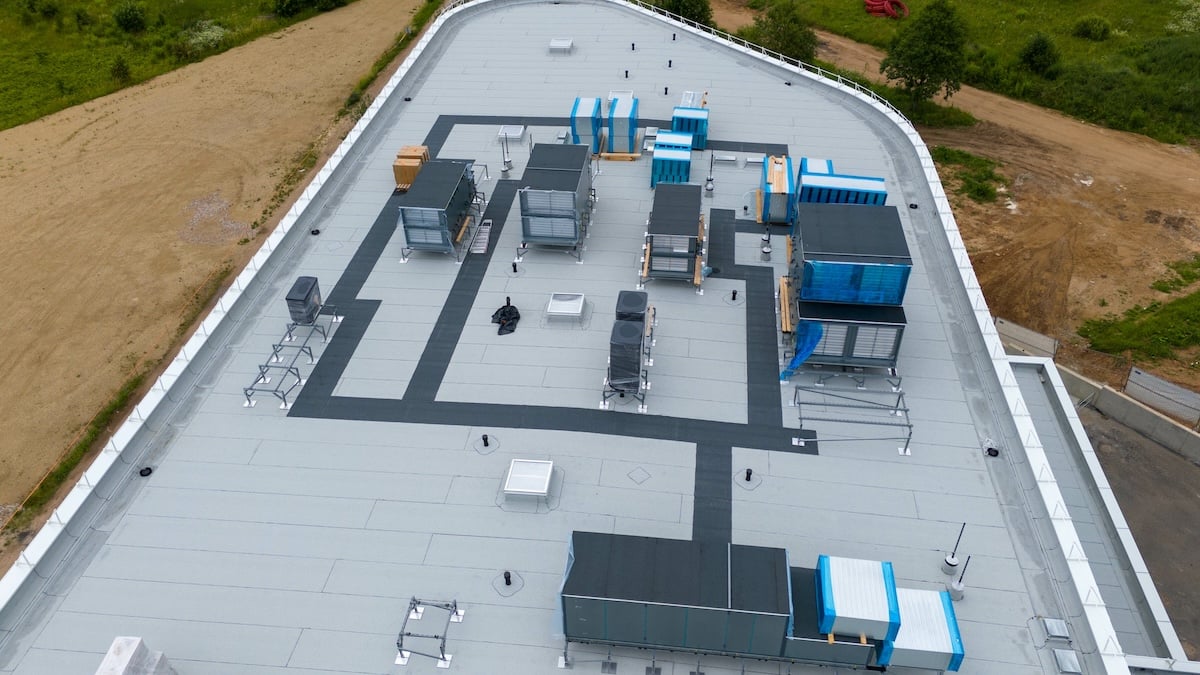
Flat Roof Replacement Cost: What to Expect In 2025
09.02.2025
8 Min Read
Planning a flat roof replacement can feel overwhelming, especially when you’re trying to budget for this major investment. Whether you own a commercial building or have a flat roof on your residential property, understanding the costs involved helps you make informed decisions and avoid unexpected expenses.
This comprehensive guide covers everything you need to know about flat roof replacement cost, from material options and labor expenses to the factors that influence your final bill. We’ll break down the numbers, explore your options, and help you understand what to expect when it’s time to replace your flat roof.
Here’s what we’ll cover:
- Average flat roof replacement costs by material type
- Key factors that affect your total project cost
- Different flat roof material options and their benefits
- Signs it’s time for a replacement vs. repair
- How to choose the right roofing contractor
- Financing options for your flat roof project
💸 Average Flat Roof Replacement Costs
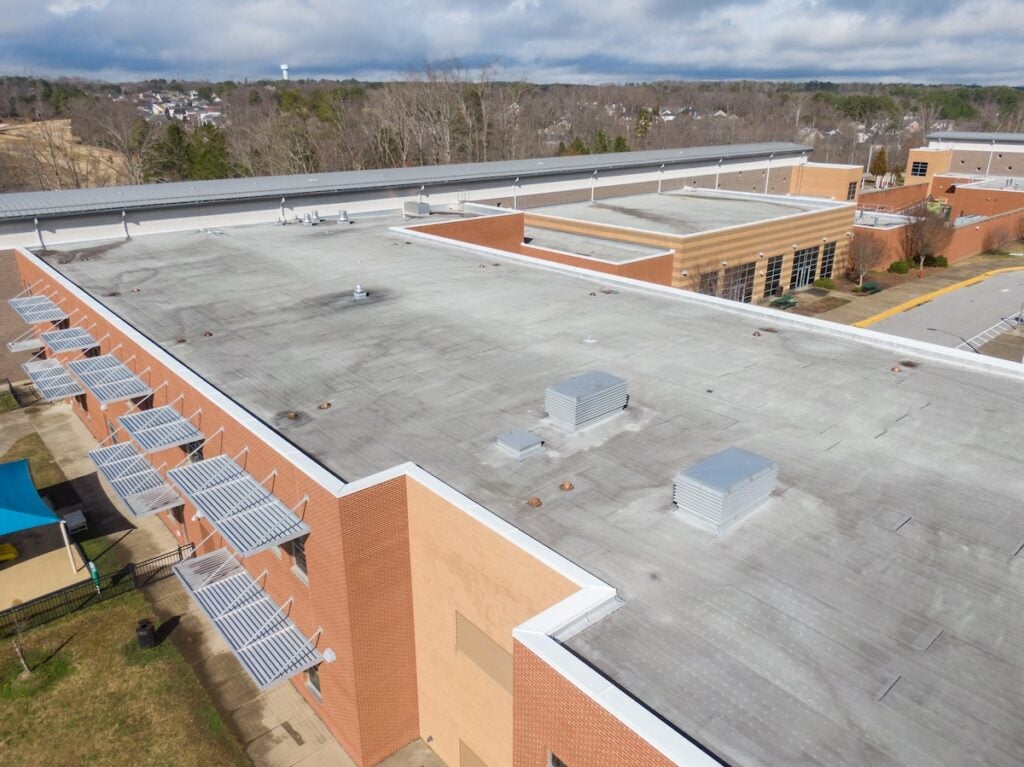
Flat roof replacement costs vary significantly based on several factors, but understanding the general price ranges helps you prepare for this investment. Here’s a breakdown:
- General Costs: Most homeowners and business owners can expect to pay between $3 and $12 per square foot for a complete flat roof replacement, including materials and labor.
- For a 1,000 Square Foot Roof: Costs typically range from $3,000 to $12,000. Premium materials and complex installations can increase costs to $15-$20 per square foot for high-end systems.
Most homeowners can expect costs between $3–$12 per sq. ft., but working with trusted roofing contractors in Cary ensures accurate estimates and reliable workmanship.
Material Costs:
The type of roofing material you select is one of the biggest drivers of cost. For commercial flat roofing replacements or new installations, we have different options, including BUR, TPO, EPDM, Modified Bitumen, or Spray Polyrethane Foam, for you to choose the one that suits your business’s purposes the most. Each material offers a different balance of durability, performance, and price, allowing you to choose the best option for your budget.
- Built-up Roofing (BUR): Budget-friendly, starting at $3-$5 per square foot.
- Single-Ply Membranes (TPO or EPDM): Typically cost $5-$8 per square foot.
- Modified Bitumen or Spray Polyurethane Foam: High-performance options ranging from $6-$12 per square foot.
Labor Costs:
Labor is a significant portion of any roofing project, often accounting for the majority of the total expense. These costs are determined by the expertise of the crew, the complexity of the installation, and the local market conditions.
- Labor typically accounts for 60-70% of the total project expense.
- In North Carolina, experienced roofing contractors charge between $2-$6 per square foot, depending on roof complexity and market conditions.
🏢 Flat Roof Material Options and Pricing
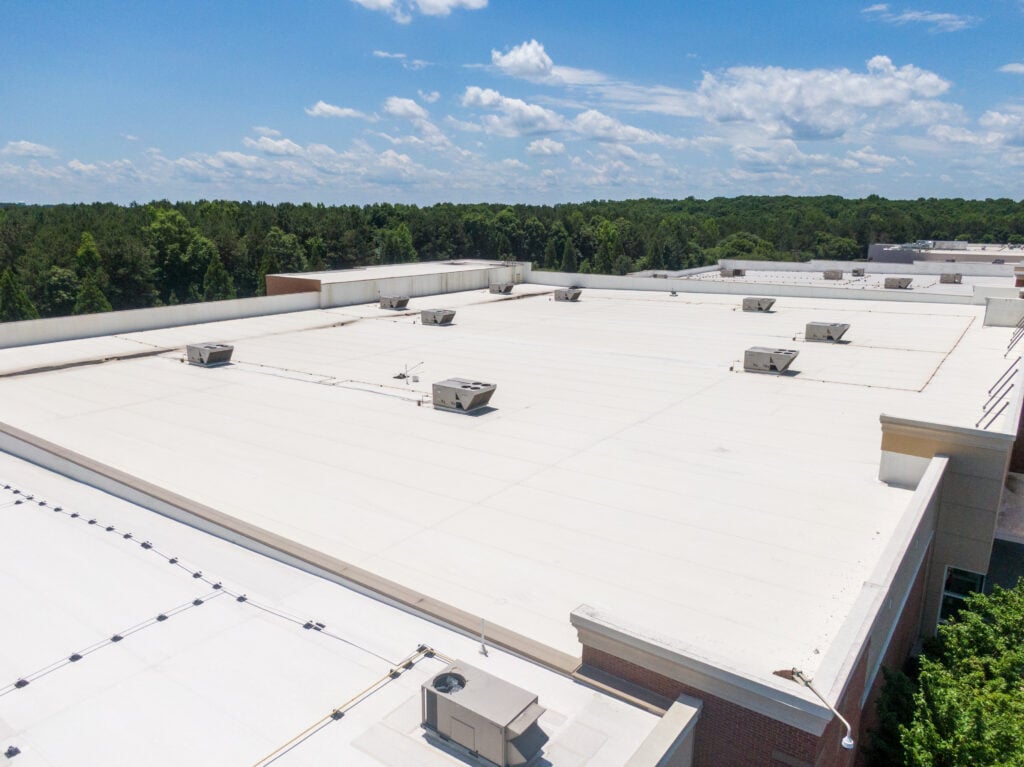
Understanding your material options is crucial for making the right choice for your property and budget. Each type of flat roofing system offers different benefits, lifespans, and price points.
Built-Up Roofing (BUR)
Built-up roofing remains one of the most economical options for flat roof replacement. This traditional system uses multiple layers of roofing felt and asphalt, topped with gravel or mineral surfacing. BUR systems typically cost $3-5 per square foot and can last 15-20 years with proper maintenance.
Single-Ply Membranes
EPDM (rubber membrane) and TPO (thermoplastic polyolefin) are popular single-ply options. EPDM costs approximately $4-7 per square foot and offers excellent durability and weather resistance. TPO, known for its energy efficiency and heat-reflective properties, ranges from $5-8 per square foot.
Modified Bitumen
This enhanced asphalt system provides superior flexibility and weather resistance compared to traditional BUR. Modified bitumen typically costs $5-9 per square foot and offers a lifespan of 20-25 years. The material comes in self-adhering or torch-applied varieties and many property owners choose local roofing in Knightdale for installation and long-term maintenance.
Spray Polyurethane Foam (SPF)
SPF systems create a seamless, monolithic roof surface that provides excellent insulation properties. While more expensive at $6-12 per square foot, SPF roofs can last 25-30 years and offer significant energy savings over time.
👉 7 Factors That Affect Flat Roof Replacement Cost
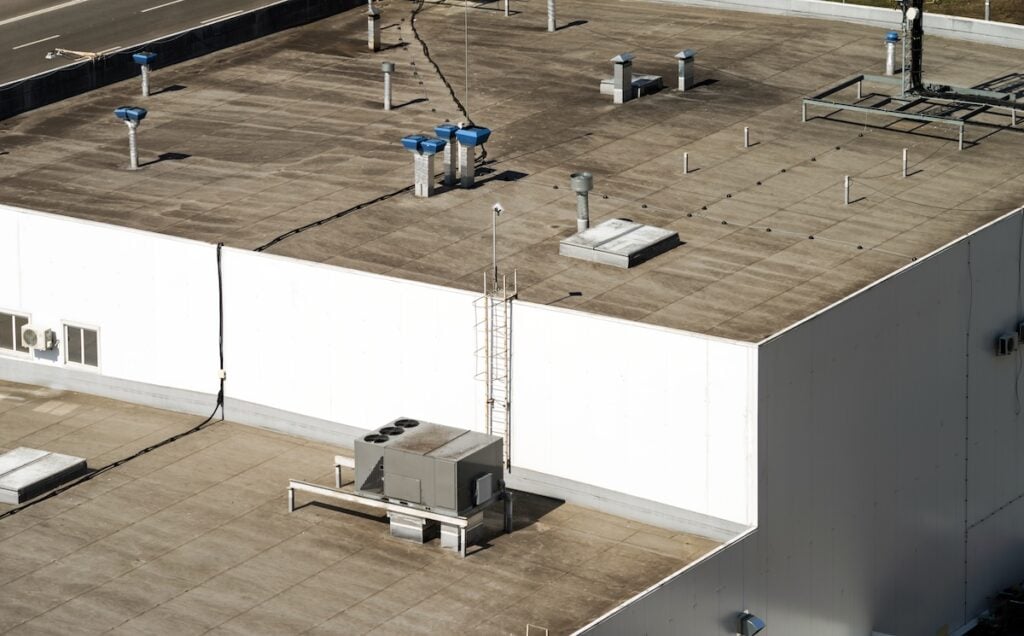
Several key factors influence your flat roof replacement cost, and understanding these variables helps you plan and budget effectively.
1. Roof Size and Complexity
Larger roofs typically benefit from economies of scale, with per-square-foot costs decreasing as size increases. However, complex roof designs with multiple levels, penetrations, or irregular shapes increase labor time and material waste, driving up costs.
2. Existing Roof Condition
If your current roof requires extensive structural repairs or multiple layer removal, expect higher costs. Some roofs can accommodate a new system over the existing one, while others need complete tear-off and disposal, which adds $1-3 per square foot to your project. Extensive structural repairs or multiple tear-offs may be needed—making a commercial roof inspection essential before budgeting replacement.
3. Structural Requirements
Older buildings may need structural reinforcement to support new roofing systems. This is particularly important when upgrading from lightweight materials to heavier options or when adding insulation layers.
4. Insulation Needs
Adding or upgrading insulation during replacement improves energy efficiency but increases upfront costs. Insulation typically adds $1-4 per square foot to your project, depending on the type and thickness required.
5. Local Building Codes and Permits
Building permit costs vary by location but typically range from $100-500 for residential projects and $500-2,000 for commercial buildings. Some areas have specific requirements for insulation, fire resistance, or wind uplift that affect material selection and costs.
6. Seasonal Timing
Roofing contractors often offer lower rates during slower seasons (late fall through early spring). However, weather conditions may limit installation options during certain times of year.
7. Contractor Experience and Location
An top-notch roofing company like us will have proper licensing and insurance, which, although, may charge premium rates, will provide better workmanship and warranty coverage. Labor costs also vary significantly by geographic location.
⚠️ Signs You Need Replacement vs. Repair
With a commercial roof inspection, you will determine whether your flat roof needs complete replacement or can be repaired affects your budget planning significantly. Here are key indicators that replacement is necessary:
Replacement Indicators:
- Age over 20 years with multiple previous repairs
- Widespread membrane deterioration or cracking
- Persistent leaks despite multiple repair attempts
- Standing water covering more than 25% of the roof surface
- Significant structural sagging or damage
- Energy costs increasing due to poor insulation performance
While flat roofs often require replacement after 20+ years, pitched homes may benefit from upgrading to the best roof shingles for long-lasting protection.
Repair Considerations:
Minor issues like isolated leaks, small membrane tears, or localized ponding water can often be addressed through targeted repairs. However, if repair costs exceed 25-30% of replacement cost, replacement typically provides better long-term value.
It is also crucial to consider the entire roofing system, not just the membrane. For flat or low-slope commercial roofs, repairs should extend to critical components like scuppers, internal drains, and gutters. Addressing these related issues ensures water is properly diverted, preventing leaks and protecting your commercial investment.
👨🔧 Choosing the Right Contractor
Reliable contractors provide detailed estimates, from roof work to add-ons like gutter installation cost so you understand the full scope of your project. Your contractor choice significantly impacts both project cost and long-term satisfaction. Here’s what to look for when evaluating roofing professionals:
Essential Qualifications:
- Valid state licensing and local business permits
- Comprehensive general liability and workers’ compensation insurance
- Manufacturer certifications for your chosen roofing system
- Strong local reputation with verifiable references
- Detailed written estimates and contracts
Red Flags to Avoid:
- Door-to-door solicitation or high-pressure sales tactics
- Requests for full payment upfront
- Significantly low bids compared to other contractors
- No local business address or proper licensing
- Reluctance to provide references or proof of insurance
Quality contractors provide detailed written estimates that break down material and labor costs, specify warranty terms, and outline project timelines. They should also be able to explain different material options and help you choose the best system for your specific needs and budget.
💵 Financing Your Flat Roof Replacement
Given the significant investment required for flat roof replacement, many property owners explore financing options to manage costs effectively.
Available Financing Options:
- Traditional bank loans or lines of credit
- Contractor financing programs
- Home equity loans or lines of credit
- SBA loans for commercial properties
- Energy efficiency rebates and tax credits
Many roofing contractors, including Barkley-Jensen Roofing & Restoration, offer financing programs that can help spread costs over time. These programs often feature competitive rates and flexible terms tailored to roofing projects.
🏠 Making the Right Investment for Your Property
Flat roof replacement represents a significant investment, but understanding the costs involved helps you make informed decisions. Remember that the lowest bid isn’t always the best value—focus on contractors who provide quality materials, skilled installation, and comprehensive warranties.
Ready to get started on your flat roof replacement project? Contact Barkley-Jensen Roofing & Restoration today for a comprehensive inspection and detailed estimate. Our experienced team will assess your current roof condition, explain your options, and provide the transparent pricing information you need to make the right decision for your property.


